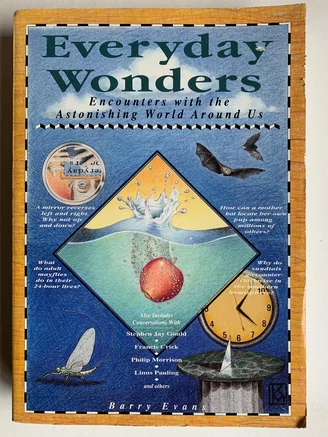$12,500! Can you believe it? That what Contemporary Books, now an imprint of McGraw-Hill, paid me as an advance back in 1992 for my book Everyday Wonders: Encounters with the Astonishing World Around Us. It was, to put it mildly, a shitload of money, paid for our second-hand Miata, now 32 years old—it’ll see me through. Contemporary offered me a three-book contract at the time, which I turned down: too much work, went traveling instead. Moved out of the Bay Area. Bought a house in Mexico. Made more friends than I deserve. Not to mention many more: “Hey Barry!” “Um, oh hi, howya doing?” acquaintances. And here I am, OTCC, late Wednesday afternoon, looking for inspiration for Sunday’s GOU.
Look no further. Check what you wrote in that book 30 years ago that made it worth so much to a publisher. Maybe there’s still something worthwhile. Start with the introduction. Hmmm, it’s a bit ponderous, trying too hard, but still, a couple of paras don’t seem too bad at this long remove:
This book is about the present, because it’s about awareness: noticing, stopping, looking, heeding, remarking, observing, beholding, discerning, perceiving, asking, examining, probing, considering, pondering, weighing, appraising, studying…right now. It’s about wonder.
Oh yeah, I remember, I felt I had to justify the title, Everyday Wonders. I asked Stephen Jay Gould if “wonder” was an adaptive trait, angling for a blurb on the back cover (“Barry has captured the essence of humanness! Buy this book!”) Actually, he snorted (he was a great snorter). “You may be thinking of curiosity,” he finally allowed. My awkward interview with him is in the book. Super smart guy, brilliant writer, funny lecturer. And a pain to interview.
Where were we?
Children enter school as question marks and leave as periods, wrote author and educator Neil Postman. I believe that what I’ve termed curiosity-wonder is innate to children, but that as adults we sometimes need to be reminded of it. Does the five-year old child who is full of questions lose his or her innocence and become the eighteen-year-old full of answers, as Postman implies?
I couldn’t leave it at that, I had to answer my own rhetorical question.
It’s instructive and awe-inspiring to watch and listen to the innocent spontaneity of humans during the first 1500 or so days of their lives, up to age 4 or 5. Every other utterance is a question about something and everything in their environment…
How wide is up?
Is the sea alive?
What shape is red?
When will I grow up?
Where is heaven?
What are the birds singing?
Why does ice cream taste
happy?
Back then, I was, apparently, an expert not only in etymology, but also in Old English folklore:
Thirteen hundred years ago, “wonder” was only a noun, synonymous with “miracle” or “marvel.” Beowulf, written around A.D. 720, contains some of the oldest English prose ever written. In stanza XIII, we encounter the word for the first time:
Then, so I’ve
heard, there were many warriors
Round the gift-hall that
fine morning;
Chieftains came from near
and far,
Long distances, to look at
the marvel, the monster’s tracks.
In the Old English verse, the last line reads, “geond wid-wegas wondor sceawian, lathes lastas.” There it is, wondor, translated here as “marvel.”
Huh. Who knew? After a few more paragraphs of deathless prose:
Other times when stargazing, I walk away from my telescope and just breathe, (This just happened, new moon evening two weeks ago, Kneeland airport with our local astronomy group). That’s when I experience long moments of awe-wonder, awe-full, precious, profound times. I know of no words to better express such moments than these, from John Fowles: (I used to devour Fowles’ novels.)
“…like lying on one’s back as we did in Spain when we slept out looking up between the fig-branches into the star-corridors, the great seas and oceans of stars. Knowing what it was to be in the universe.”
That’s all folks.

CLICK TO MANAGE